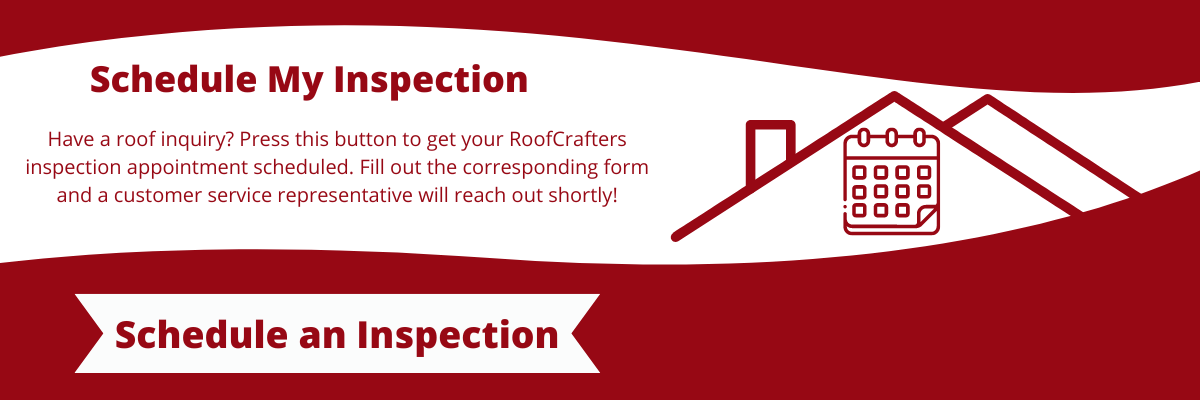Commercial Construction: The Benefits of Flat vs. Pitched Roofing
April , 2024 | 7 min. read
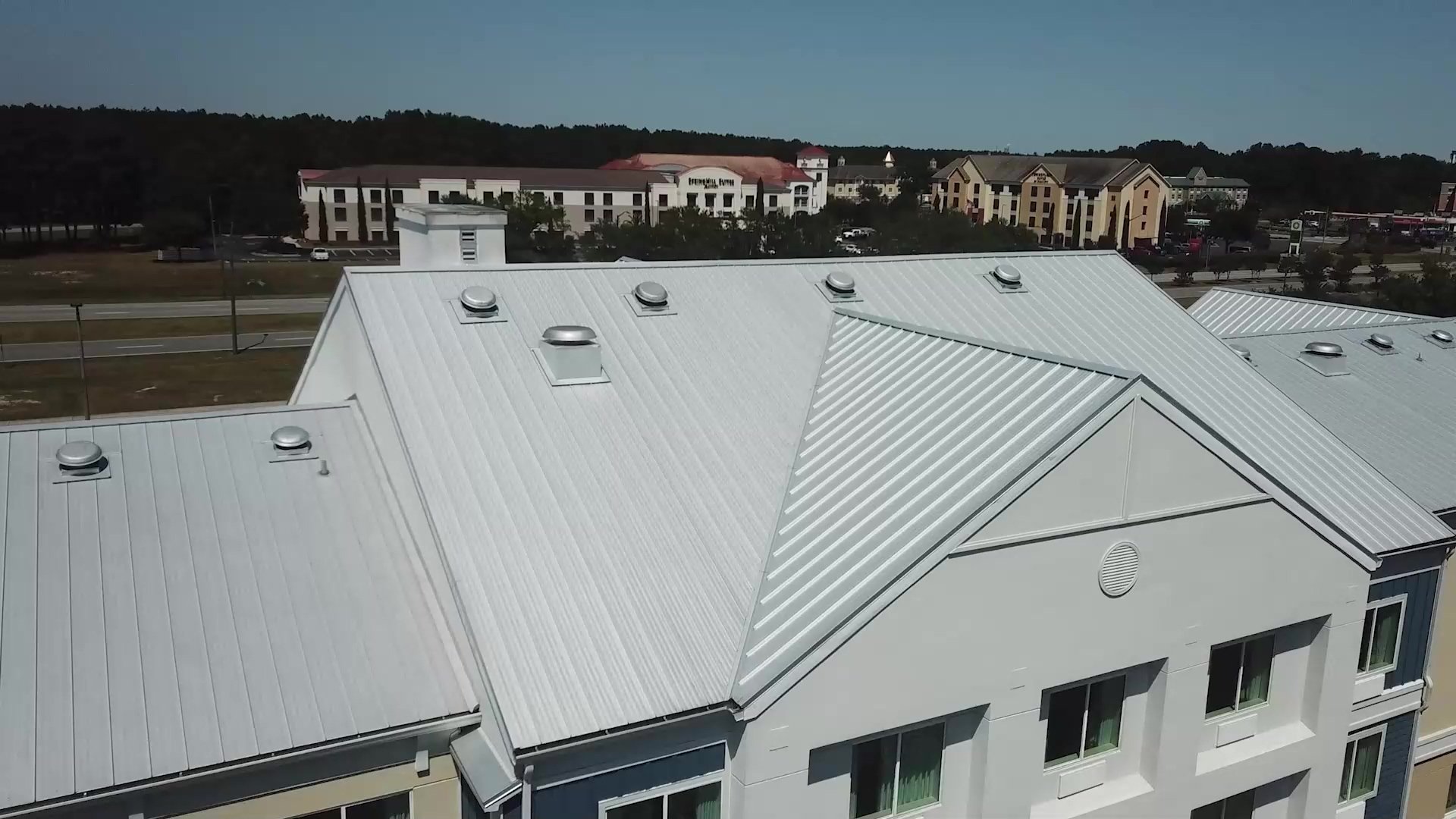
So, you're on the lookout for the perfect roof for your commercial space, huh? Well, good news, because we're about to dive into your options, specifically, flat and pitched roofing. Now, you might be wondering, 'What's the big deal? It's just a roof, right?' Wrong! Your roof doesn’t get nearly enough credit as it should, protecting you from the elements and keeping everything snug and dry inside.
At RoofCrafters, we’re all about the benefits of construction, so let’s talk about them. Flat roofing is like the cool, laid-back friend who's always chill no matter what. Need easy access for maintenance? Check. Dreaming of a rooftop ready to be complete with solar panels? Double check.
Don't forget about pitched roofing, though! It's the classic, reliable choice that's been around forever. With its natural water runoff and tons of style options, it's like the OG of roofs. While both of these roofing styles are dependent on the structure of your building, let’s dive deeper into the benefits of them both, starting with flat roofing!
What Is Commercial Flat Roofing?
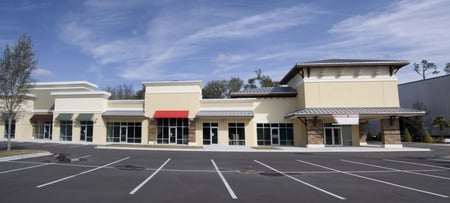
Commercial flat roofing is basically what it sounds like – the type of roofing you typically see on big buildings like office complexes, malls, or warehouses. Instead of having a pitched or sloped design like you might see on a house, flat roofing is, well, flat.
These roofs are often made of materials like modified bitumen, EPDM (ethylene propylene diene terpolymer), TPO (thermoplastic polyolefin), or PVC (polyvinyl chloride). They're pretty durable and can withstand a lot of wear and tear, which is important when you've got a big building with a lot going on up top. Plus, they're usually easier to maintain and repair compared to traditional pitched roofs.
But hey, they're not perfect. Sometimes they can be prone to leaking if they're not installed or maintained properly, and they might need more frequent inspections to catch any issues early on. Overall though, commercial flat roofing is a solid choice for keeping big buildings dry and protected from the elements.
What Is Commercial Pitched Roofing?
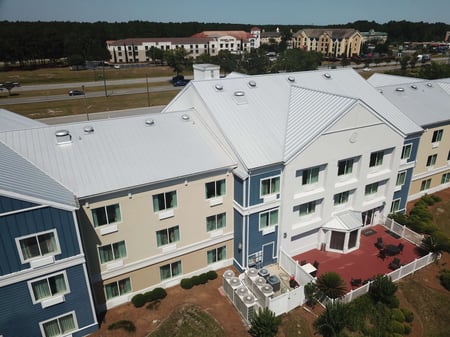
Unlike flat roofs that can sometimes struggle with drainage and are more prone to water pooling, pitched roofs have a slope to them, kind of like a gentle incline. This slope allows rain, snow, leaves, and debris to slide off easily, preventing any potential buildup that could lead to leaks or damage. It's like nature's own self-cleaning mechanism!
Now, what makes pitched roofing so appealing is its versatility. You've got a wide range of materials to choose from, each with its own unique characteristics. There are traditional options like asphalt shingles, which offer durability and affordability, or you could opt for something more modern and sleek like metal roofing, which not only looks sharp but also lasts a long time with minimal maintenance.
Beyond the practical benefits, pitched roofs also offer aesthetic appeal. They can give your building a classic, timeless look or add a contemporary flair, depending on your preferences. Plus, they come in various colors, textures, and designs, allowing you to customize the appearance to suit your style. In a nutshell, pitched roofing is like the reliable backbone of your building, offering both functionality and style in one neat package.
The Benefits of Flat Roofing vs. Pitched Roofing
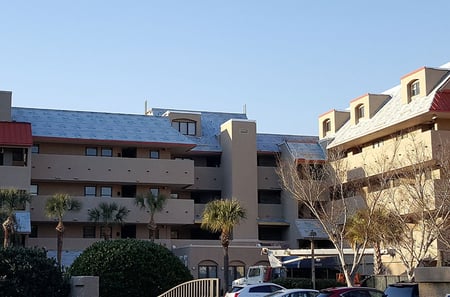
So, now that you have a little background information about these two styles of roofing, you're faced with the big decision: flat roofing or pitched roofing? Both have their perks, so let's weigh them out.
|
Features |
Flat Roofing |
Pitched Roofing |
|
Accessibility |
✔ Easy access for maintenance and usage |
✘ Limited accessibility, may require ladders or scaffolding |
|
Drainage |
✘ Requires efficient drainage systems |
✔ Natural water runoff due to slope |
|
Space Utilization |
✔ Ample space for rooftop installations like gardens or solar panels |
✘ Less usable space due to slope |
|
Style Options |
✔ Modern, minimalist aesthetic |
✔ Wide variety of styles and materials |
|
Durability |
✔ Less prone to wind damage |
✔ Better resistance to heavy rain and snow |
|
Cost |
✔ Generally more cost-effective upfront |
✘ Higher initial cost for materials and labor |
First up, flat roofing.
Think of it like a smooth, sleek surface stretching out above your head. One of the biggest perks? Accessibility! With a flat roof, you can easily hop up there for maintenance and inspections. Plus, if you're into the idea of rooftop gardens or solar panels, a flat roof gives you plenty of space to play with.
But here's the thing: flat roofs can be a bit trickier when it comes to drainage. Since there's no slope, water doesn't naturally run off like it does with a pitched roof. So, you've got to make sure your drainage system is top-notch to avoid any puddles or leaks.
Now, let's talk about pitched roofing.
One major benefit? That slope! It's a contractor's way of saying, "See ya later, water ponding!" Pitched roofs also offer tons of style options. From traditional shingles to sleek metal panels, there's a look for every vibe. Plus, they're great for areas with heavy snowfall, since that slope helps prevent snow from piling up and causing issues.
But, here's the catch: pitched roofs can be pricier upfront compared to flat roofs. That extra slope means more materials and labor, so it's something to keep in mind if you're on a tight budget.
So, there you have it—flat roofing vs. pitched roofing, each with its own set of pros and cons. Whether you go for the modern vibes of a flat roof or the classic charm of a pitched one, just make sure it suits your needs and style. After all, your roof is like the cherry on top of your building—might as well make it count!
Choosing the Right Roof for Your Commercial Property
When it comes to choosing between flat roofing and pitched roofing for commercial buildings, each option offers distinct advantages suited to different needs and preferences. Flat roofing provides easy accessibility for maintenance and additional space utilization for rooftop installations such as gardens or solar panels. It offers a modern aesthetic and is generally more cost-effective upfront.
On the other hand, pitched roofing offers natural water runoff due to its slope, making it less susceptible to water damage and better resistant to heavy rain. It provides a wide variety of styles and materials to choose from, allowing for greater customization to match the building's aesthetic.
Ultimately, the decision between flat and pitched roofing depends on factors such as budget, desired aesthetics, maintenance preferences, and above all, building structure. If you’re due for a roof replacement on your commercial space, be sure to hit the “Schedule an Inspection” button down below, and one of our experts will walk you through which option is best for you!
My name is Cassie, and I’m the Content Manager here at RoofCrafters. I was born and raised in Chicago, Illinois, and made my way out to Florida post-college graduation. I’m incredibly passionate about writing and creating valuable content that helps others with the collaboration of my marketing team. When I’m not working, I enjoy shopping (a little too much), spending time at the beach, and reading!



